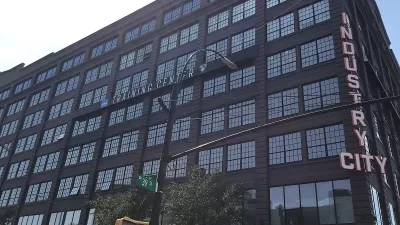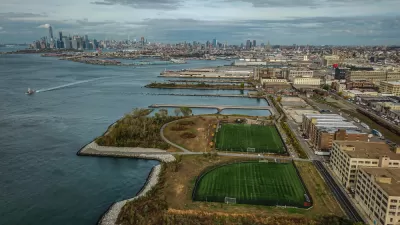A new cease-and-desist zone, meant to control the activities of house flippers, is under consideration in the Brooklyn neighborhood of East New York, as well as state laws that would increase the real estate transfer tax.
Allison Dikanovic reports on an effort in New York City "to protect homeowners from harassment from real estate speculators by designating the neighborhood as Brooklyn’s only 'cease-and-desist' zone — an area declared off-limits under state law."
"Cease-and-desist protections would allow homeowners to opt into a list restricting would-be house flippers from contacting them — and hit violators with fines, criminal charges or loss of real estate licenses," explains Dikanovic.
The effort so far has the backing of the Coalition for Community Advancement and Democratic State Senator Julia Salazar. The decision to grant "cease-and-desist" powers is held by the state's Department of State, which is holding a public hearing on the proposal this week. The Department of State gained the power to grant "cease-and-desist" status in 1989, but only three neighborhoods in New York City have achieved that status. According to Dikanovic, all three are in suburban-style, largely white and Asian middle-class areas.
"While the Department of State process is underway in East New York, lawmakers in Albany are working on a bill that would make all of Brooklyn a cease-and-desist zone for five years," reports Dikanovic. Advocates are pushing for other methods to counter flipping, like increasing the real estate transfer tax, "which would make it more expensive to re-sell a property within two years of purchasing it," according to Dikanovic. Multiple bills under consideration at the state capital would implement a form of real estate transfer tax.
FULL STORY: HARRIED EAST NEW YORK HOMEOWNERS SEEK BAN ON HOUSE FLIPPERS

Planetizen Federal Action Tracker
A weekly monitor of how Trump’s orders and actions are impacting planners and planning in America.

Restaurant Patios Were a Pandemic Win — Why Were They so Hard to Keep?
Social distancing requirements and changes in travel patterns prompted cities to pilot new uses for street and sidewalk space. Then it got complicated.

Map: Where Senate Republicans Want to Sell Your Public Lands
For public land advocates, the Senate Republicans’ proposal to sell millions of acres of public land in the West is “the biggest fight of their careers.”

Maui's Vacation Rental Debate Turns Ugly
Verbal attacks, misinformation campaigns and fistfights plague a high-stakes debate to convert thousands of vacation rentals into long-term housing.

San Francisco Suspends Traffic Calming Amidst Record Deaths
Citing “a challenging fiscal landscape,” the city will cease the program on the heels of 42 traffic deaths, including 24 pedestrians.

California Homeless Arrests, Citations Spike After Ruling
An investigation reveals that anti-homeless actions increased up to 500% after Grants Pass v. Johnson — even in cities claiming no policy change.
Urban Design for Planners 1: Software Tools
This six-course series explores essential urban design concepts using open source software and equips planners with the tools they need to participate fully in the urban design process.
Planning for Universal Design
Learn the tools for implementing Universal Design in planning regulations.
Heyer Gruel & Associates PA
JM Goldson LLC
Custer County Colorado
City of Camden Redevelopment Agency
City of Astoria
Transportation Research & Education Center (TREC) at Portland State University
Camden Redevelopment Agency
City of Claremont
Municipality of Princeton (NJ)




























